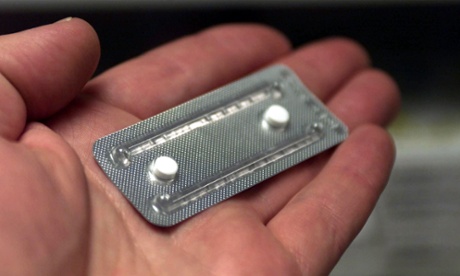
The morning-after pill has been officially licensed for use by girls under 16 for the first time and is set to be available from pharmacies across the country. EllaOne, which has the advantage of being effective five days after sexual intercourse, has received a change of licence from the European medicines agency, which means it is available for use by any woman of reproductive age in Europe.
Tony Fraser, the general manager of HRA Pharma in the UK and Ireland, which makes the pill, said he felt it was “important that we look at these things pragmatically and realistically. Girls don’t go to the pharmacy unless something has happened and they need care”.
The UK has one of the highest rates of teenage pregnancy in Europe. Although the latest figures, released in February, showed a drop of 14% on the previous year, there were still 4,648 pregnancies in girls under 16. There were 24,306 pregnancies in under-18s, just over half of which ended in abortion.
Girls under 16 are below the age of consent, but an existing scheme operated by the NHS devised to help combat teenage pregnancies has allowed certain pharmacists to supply the teenagers with morning-afters pill such as Levonelle. But ellaOne is available in any pharmacist that stocks it.
A girl hoping to buy the pill will be asked whether she is willing to tell her parents that she has had unprotected sex, or if not, whether she is willing for somebody else to tell them. There will be questions intended to ascertain whether the girl is “Gillick competent” – meaning she has sufficient understanding of what has happened to her and the consequences of taking the morning-after pill.
The British Pregnancy Advisory Service (BPAS) said the advent of the first morning-after pill licensed for under-16s will do nothing to help a girl when she is in a crisis, afraid she might be pregnant. Even though a teenager could theoretically buy ellaOne themselves – if they could afford the £34.95 recommended retail price – they would still have to endure the embarrassment of the interview with the pharmacist, who will ask about their contraception or lack of it.
Abigail Fitzgibbon, the head of advocacy and campaigns at BPAS, said: “Taking emergency contraception is a mature, responsible decision – yet women are faced with a multitude of barriers. In our experience, the high cost, lack of access and embarrassment women face when buying emergency contraception deter many from trying to get it at all, and these obstacles can be even more difficult to negotiate for younger women.
“Once contraception has failed, or a couple have had unprotected sex, emergency contraception is the only effective way to prevent unplanned pregnancy. We welcome moves to make emergency contraception more accessible, but in order to make a real difference, we need to stop stigmatising the women who take it, and it needs to be regulated in exactly the same way as any other method of contraception: not priced out of reach or a symbol of shame.”
Fitzgibbon said there are confused messages in the UK: a tension between the desire to combat the high teenage pregnancy rate and a reluctance to believe that underage girls can make responsible decisions for themselves.
Norman Wells, director of the Family Education Trust, which is opposed to emergency contraception for under-16s, said the new licence was granted on the basis of a study involving 50 girls who had asked for emergency contraception and been given ellaOne. He said: “Quite apart from questioning whether such a small sample provides sufficient scientific basis for this conclusion, there are plenty of health and social reasons against making ellaOne available to minors. The availability of the morning-after pill is encouraging some adolescents to engage in casual sex when they might not otherwise have done so, and the supply of emergency birth control to young people is associated with an increase in sexually transmitted infections.”
The Family Planning Association said it was important that pharmacists ensure girls are Gillick competent, but a spokeswoman said: “We don’t think people under 16 should be discriminated against if they need emergency contraception.” In practice, the organisation did not think the new licence for ellaOne would change anything. The spokeswoman added: “We’d like to see a lot more free provision of emergency contraception.”
The Royal Pharmaceutical Society, which represents pharmacists, has issued guidance to them on responding to underage girls who may seek the morning-after pill. It warned: “You should be aware of important issues such as non-consensual intercourse, child protection, vulnerable adults, consent and confidentiality. Sexual activity with children under the age of 16 is also an offence but may be consensual. The law is not intended to prosecute mutually agreed sexual activity between young people of a similar age, unless it involves abuse or exploitation.”

